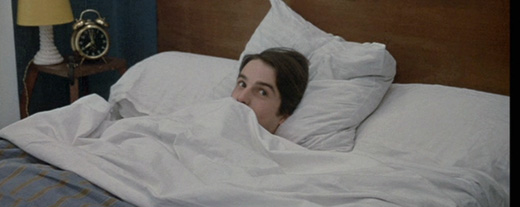Morning Read
Monday, February 11th, 2008¶ An interesting detail in today’s tale from the Decameron (IV, vi): The podestà , having wrestled in vain with the heroine’s chastity, has to explain the situation to the girls father.
The chief magistrate, thinking it preferable to make a clean breast of his attempt on the girl rather than to wait for her to denounce him, began by praising her for her constancy, in proof of which he went on to describe how he had behaved towards her. On discovering how resolute she was, he had fallen deeply in love with her.
Some “clean breast.” The original does not use such a figure of speech, but is more naked about tactics; I’d render it thus: “The podestà , preferring to accuse himself than to being accused by her…” This curious story, like IV, ii, seems to run two tales together: first, that of the woman who must honorably dispose of the body of her secret husband after his death from natural causes, and that of a powerful man who claims to have fallen in love with a woman whom he was unable to rape.
¶ In the Aeneid, the Sybil leads Aeneas into the underworld. It is impossible not to think of Dante, who enlarges considerably on most of Virgil’s lines. Interestingly, Dante crowds the hither bank of the Acheron not with Virgil’s unburied (as, Palinurus) but with people who never made up their minds about belief.
Heaven case them forth — their presence there would dim
  The light; deep Hell rejects so base a herd,
  Lest sin should boast itself because of them.
                                        (Inferno, III, 40-42; translation by Dorothy L Sayers)
¶ C K Williams: These New Poems are vastly more accessible than the ones in A Dream of Mind. In “The Blade,” a poem dated to the 2004 presidential election, the poet compares the US to Franco’s Spain, in the grip of “fearmongering, slander and lies.” I’m sorry that I didn’t know the poem at the time.
¶ Today’s Blogging Hero: Ken Fisher, of Ars Technica. “Ars Technica has developed a huge following by focusing not just on technical topics, but on the full range of human arts and sciences.” A cursory glance at the site suggests this may be the most preposterous statement in Michael Banks’s book. Ken Fisher comes off, though, as somewhat more serious (in the French sense) than any of the previous heroes.
¶ Now that I have The Red and the Black on hand, I see that I was doing fine with the original: the translation doesn’t really clear up any of the little mysteries that I attributed to faulty comprehension. My ancient Livre de poche edition, I find, even prints a paragraph of today’s chapter (XXV, “The Seminary”) out of place, where it makes no sense.
¶ Writing about Marcel Reich-Ranicki — a German critic whose name one sees more and more — Clive James introduces me to a new and delightful word: Mumpitz, “that useful German word for exalted twaddle.” Of which there is apparently none in the writings, easily read in German according to James, of this issuer of death-certificates (to “dead” works of art).
¶ No more Mitfords for the time being, now that I’ve done with the latest collection of letters. Something tells me that I won’t be able to stay away from Jessica’s letters for long, though. Of all the sisters, she seems to have had the keenest sense of linguistic absurdity, than which there is no greater teacher.



















